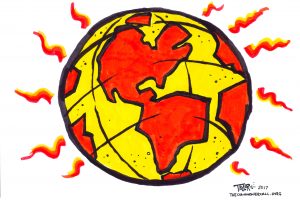From now on, house style guide recommends terms such as ‘climate crisis’ and ‘global heating’.
By Damian Carrington, Environment editor
The Guardian (5/17/19)
The Guardian has updated its style guide to introduce terms that more accurately describe the environmental crises facing the world.
Instead of “climate change” the preferred terms are “climate emergency, crisis or breakdown” and “global heating” is favoured over “global warming”, although the original terms are not banned.
“We want to ensure that we are being scientifically precise, while also communicating clearly with readers on this very important issue,” said the editor-in-chief, Katharine Viner. “The phrase ‘climate change’, for example, sounds rather passive and gentle when what scientists are talking about is a catastrophe for humanity.”
“It’s 2019. Can we all now call it what it is: climate breakdown, climate crisis, climate emergency, ecological breakdown, ecological crisis and ecological emergency?”
— Greta Thunberg, teen environmental activist
“Increasingly, climate scientists and organisations from the UN to the Met Office are changing their terminology, and using stronger language to describe the situation we’re in,” she said.
The right words to reflect reality
The United Nations secretary general, António Guterres, talked of the “climate crisis” in September, adding: “We face a direct existential threat.” The climate scientist Prof Hans Joachim Schellnhuber, a former adviser to Angela Merkel, the EU and the pope, also uses “climate crisis”.
In December, Prof Richard Betts, who leads the Met Office’s climate research, said “global heating” was a more accurate term than “global warming” to describe the changes taking place to the world’s climate. In the political world, UK MPs recently endorsed the Labour party’s declaration of a “climate emergency”.
The scale of the climate and wildlife crises has been laid bare by two landmark reports from the world’s scientists. …
(Commoner Call art by Mark L. Taylor, 2017. Open source and free for non-derivative use with link toe www.thecommonercall.org )
*****
What If We Covered The Climate Crisis Like We Did The Start Of World War II?
The purpose of journalism was to awaken the world to the catastrophe looming ahead of it. We must approach our climate crisis the same way.
By Bill Moyers
The Guardian (5/22/19)
I have been asked to bring this gathering to a close by summing up how we can do better at covering the possible “collapse of our civilizations and the extinction of much of the natural world,” to quote the noted environmentalist David Attenborough, speaking at the recent United Nations climate summit in Poland.
I don’t come with a silver bullet. And I’m no expert on the topic. Like you, I am just a journalist whose craft calls for us to explain things we don’t understand. There’s so much I don’t understand that journalism became my continuing course in adult education. The subjects were so fascinating, and the work so fulfilling, that I kept at it “full speed ahead” for half a century, until two years ago, at the age of 83, I yielded finally to the side effects of a long life and retired (more or less). This is the first opportunity I have had since then to be with so many kindred spirits of journalism, and the camaraderie reminds me how much I have missed your company.
Many of us have recognized that our coverage of global warming has fallen short. There’s been some excellent reporting by independent journalists and by enterprising reporters and photographers from legacy newspapers and other news outlets. But the Goliaths of the US news media, those with the biggest amplifiers—the corporate broadcast networks—have been shamelessly AWOL, despite their extraordinary profits. The combined coverage of climate change by the three major networks and Fox fell from just 260 minutes in 2017 to a mere 142 minutes in 20l8—a drop of 45%, reported the watchdog group Media Matters.
“Ghost newspapers”
Meanwhile, about 1,300 communities across the United States have totally lost news coverage, many from newspaper mergers and closures, according to the University of North Carolina School of Media and Journalism. Hundreds of others are still standing only as “ghost newspapers.” They no longer have resources for even local reporting, much less for climate change. “Online news sites, as well as some TV newsrooms, are working hard to keep local reporting alive, but these are taking root far more slowly than newspapers are dying,” observes Tom Stites of Poynter in a report about the study. And, alas, many of the news outlets that are still around have ignored or misreported the climate story and failed to counter the tsunami of deceptive propaganda unleashed by fossil-fuel companies and the mercenaries, ideologues, and politicians who do their bidding.
But events educate, experience instructs, and so much destructive behavior has been caused by climate disruption that more Americans today than ever seem hungry to know what’s causing it, what’s coming and what can be done about it. We journalists have perhaps our last chance to help people grasp the magnitude of the threat. …
(Today marks the official launch of Covering Climate Now, a project co-sponsored by The Columbia Journalism Review and The Nation. Joined by The Guardian and others partners to be announced, Covering Climate Now will bring journalists and news outlets together to dramatically improve how the media as a whole covers the climate crisis and its solutions.)


